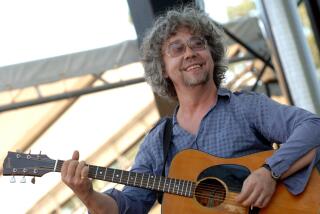Wailers Watching : Reggae Fans Can Spot the Influence of Bob Marley, but the Band Doesn’t Just Spout the Past
- Share via
It was like trying to catch a Rastaman version of a will-o’-the-wisp, with a bit of the Keystone Cops thrown in. Junior Marvin, leader and manager of what’s left of reggae’s legendary Wailers, couldn’t be found anywhere.
Representing a group with no press liaison or stateside record label, Marvin was always five minutes ahead or behind of the phone calls placed to various motel rooms throughout the country in an attempt to determine just what the Wailers are in 1995. One imagined him bounding happily about on the road in a trail of ganja smoke and dreadlocks, blissfully oblivious to the usual promotional demands made of touring acts.
When finally pinned down, he begged off, saying he had to “go take care of bills. Call back in 15 minutes, OK?” Sure enough, 15 minutes later, he was ready to be interviewed--but what was that noise in the background? It sounded like a pack of screaming children! “I’ve got four kids on tour with me,” he confirmed with a laugh.
One couldn’t help but think what a long way it was from the heyday of the Wailers to this.
The Wailin’ Wailers (the name later was shortened) were formed in the Trenchtown ghetto of Kingston, Jamaica, in 1964. Fronted by the vocal trio of Bob Marley, Peter Tosh and Bunny Livingston, the group cut such singles as “Put It On,” “The 10 Commandments of Love” and “Love and Affection” before committing to the Rastafarian faith in 1969. That conversion, and the changes that resulted in the group’s sound and spiritual cast, were the genesis of reggae as it is known today.
*
Signed to Island Records in 1972, the group soon would change its name again--to Bob Marley and the Wailers, and Marley would become recognized as one of the most important musical figures of the century. But tragedy followed Marley and his cohorts.
Resentful of the fawning on Marley, Tosh and Livingston left in 1974, but their own careers never came close to the heights enjoyed by their former partner. Tosh was murdered by burglars in 1987 (the same year that Wailers drummer Carlton Barrett was shot dead outside his Kingston home).
*
A politically motivated would-be assassin shot Marley, his wife and manager in 1976. All survived the attack. Marley died of cancer five years later at age 36, at the height of his popularity.
With Marley and Tosh dead, and Livingston pursuing a solo career, one might wonder: What is the point of any group of musicians touring in the ‘90s under the Wailers banner? Local audiences will have the opportunity to judge for themselves Saturday night when the band opens for Third World at the Coach House in San Juan Capistrano.
“We have a lot to live up to,” acknowledged lead singer/guitarist Marvin, 40, who became a Wailer in 1977. But, he added, “you have to remember that we played with [Marley], and if we hadn’t been up to a certain standard, we wouldn’t have. It’s not a question of whether we can play or not; it’s a question of whether we can maintain that standard. Not just maintain it, we would also like to go higher.”
Besides Marvin, today’s Wailers consist of percussionist Alvin Patterson, bassist Aston (Family Man) Barrett and organist Earl (Wire) Lindo--all of whom played with Marley at one time or another--plus keyboard player Martin Batista, drummer Michael Richards, guitarist Hiro Fukai and background singers Renee Taylor and Peter Gayle.
The group usually performs about a 50-50 split between new songs and Marley classics, though Marvin said the repertoire currently is slanted more in Marley’s favor, as 1995 would have been his 50th birthday.
And how accepting are people of these Wailers?
“They respond to everything,” Marvin answered. “They come and hear the first song, and they start dancing. They expect to dance and rejoice and get absorbed into some communication of positive vibration, to be uplifted. Because of the history of the Wailers, they’re psyched up.
*
“We don’t have to put on a big show and do cartwheels. They want to hear the old songs; they want to hear the new songs, they come with intent and curiosity. When we play, they’re ready.
“We try to create. If called upon, we can go back and reproduce any sound we’ve already done. But if you limit yourself, that’s not fulfilling Jah’s creation. Jah’s creation is limitless. . . . The message of the music is to bring people together. We’re firm believers in the Rastafarian faith. Therefore, our ultimate goal is to live under one banner, one love, and the only way we know how to do that is to channel that energy into the music and try to pull people in.
“This isn’t a gig just to make money. It’s a duty to perform.”
* The Wailers open for Third World Saturday at the Coach House, 33157 Camino Capistrano, San Juan Capistrano. 7 and 10:30 p.m. $29.50. (714) 496-8930.
More to Read
The biggest entertainment stories
Get our big stories about Hollywood, film, television, music, arts, culture and more right in your inbox as soon as they publish.
You may occasionally receive promotional content from the Los Angeles Times.










